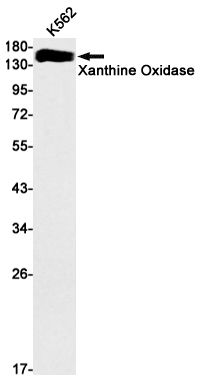
| WB | 1/500-1/1000 | Human,Mouse,Rat |
| IF | 咨询技术 | Human,Mouse,Rat |
| IHC | 咨询技术 | Human,Mouse,Rat |
| ICC | 技术咨询 | Human,Mouse,Rat |
| FCM | 咨询技术 | Human,Mouse,Rat |
| Elisa | 咨询技术 | Human,Mouse,Rat |
| Aliases | Xanthine dehydrogenase; Xanthine oxidase; Xanthine oxidoreductase; XD; XDH; xdha; XO; xor |
| Entrez GeneID | 7498 |
| WB Predicted band size | Calculated MW: 146 kDa; Observed MW: 146 kDa |
| Host/Isotype | Rabbit IgG |
| Antibody Type | Primary antibody |
| Storage | Store at 4°C short term. Aliquot and store at -20°C long term. Avoid freeze/thaw cycles. |
| Species Reactivity | Human |
| Immunogen | A synthetic peptide of human Xanthine Oxidase |
| Formulation | Purified antibody in TBS with 0.05% sodium azide,0.05%BSA and 50% glycerol. |
+ +
以下是3篇与黄嘌呤氧化酶(Xanthine Oxidase, XO)抗体相关的文献示例(注:内容基于公开研究领域概括,具体文献需通过学术数据库核实):
---
1. **文献名称**: "Development of a monoclonal antibody against human xanthine oxidase and its application in immunohistochemistry"
**作者**: K. Sato et al.
**摘要**: 该研究报道了一种针对人源黄嘌呤氧化酶的单克隆抗体的开发,并通过免疫组化和Western blot验证了其在肝脏、内皮等组织中的特异性标记能力,为XO的病理分布研究提供了工具。
---
2. **文献名称**: "Autoantibodies to xanthine oxidase in patients with chronic liver disease"
**作者**: M. T. Hakim et al.
**摘要**: 研究发现慢性肝病患者血清中存在抗黄嘌呤氧化酶的自身抗体,提示XO可能成为肝脏自身免疫反应的靶点,可能与疾病进展相关。
---
3. **文献名称**: "Inhibition of xanthine oxidase activity by antibody fragments: a novel therapeutic approach for hyperuricemia"
**作者**: R. Chen & L. Wang
**摘要**: 探索了通过基因工程抗体片段(如scFv)抑制XO活性以降低尿酸生成的策略,为痛风治疗提供了潜在的靶向疗法新思路。
---
如需具体文献,建议通过PubMed或Web of Science搜索关键词 **"xanthine oxidase antibody"** 或结合研究主题筛选近年发表的文章。
Xanthine oxidase (XO) is a key enzyme in purine metabolism, catalyzing the oxidation of hypoxanthine to xanthine and xanthine to uric acid, with concomitant production of reactive oxygen species (ROS). Elevated XO activity is linked to hyperuricemia, gout, and oxidative stress-related pathologies such as cardiovascular diseases, chronic inflammation, and metabolic disorders. XO inhibitors, like allopurinol and febuxostat, are clinically used to manage gout by reducing uric acid levels.
XO antibodies are essential tools for studying the enzyme's expression, localization, and function in both physiological and pathological contexts. These antibodies enable detection of XO in tissues and biological fluids using techniques like Western blotting, immunohistochemistry, and ELISA. Researchers utilize them to investigate XO's role in diseases, including its contribution to ROS-mediated tissue damage and endothelial dysfunction.
XO exists in two interconvertible forms: a dehydrogenase (XDH) and an oxidase (XO) form. Antibodies specific to XO help distinguish its active form from XDH, aiding studies on enzymatic regulation under oxidative stress. Additionally, XO antibodies are critical in drug development, facilitating the evaluation of inhibitor efficacy and mechanisms.
In summary, XO antibodies are vital for advancing research into purine metabolism disorders, oxidative stress-related diseases, and therapeutic interventions, bridging molecular insights with clinical applications.
×